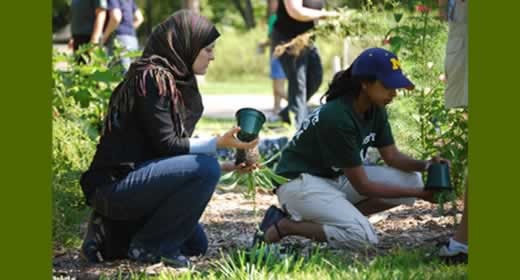
Once the capital of the industrial world, Detroit has for the past four decades become one of the nation's pre-eminent symbols of urban decline. Globalization, deindustrialization and "white flight" ravaged once-proud neighborhoods and turned much of the city's tax base to rubble. But vital signs of a new post-industrial urban ecology in Detroit are now becoming visible. In neighborhoods where blight, arson and poverty have leveled houses and left vacant lots in their places, vegetable and flower gardens, local commerce and vibrant community cultures are starting to flourish.
At the end of August, as part of the Ford School's annual Public Service Day, a group of more than 60 graduate students plus 3 staff members teamed up with the Northwest Detroit Neighborhood Development organization (NDNDhome.org) to assist Detroit's emerging era of green development. NDND is committed to revitalizing the Brightmoor area through an innovative mixture of low-cost home financing, construction, renovation and community empowerment projects. Rather than let fertile land lie fallow NDND is leading local cultivation efforts. As a result many low- and middle-income residents are now able to grow, consume and trade their own organic, locally-grown produce.
According to second year student Sara Margaret Gilbert, the Ford School's volunteers were put to work for the day on a healthy range of urban gardening efforts. "We harvested tomatoes from their community garden, planted flowers and cleared debris from vacant lots that will be turned into more gardening space." In the process they helped to sow a hopeful vision of the future for Detroit and possibly for many other de-industrialized American cities.
Photo credit: Dave Gavlinksi.